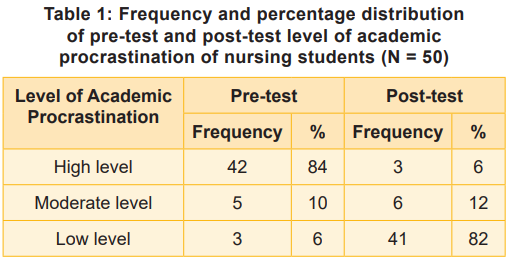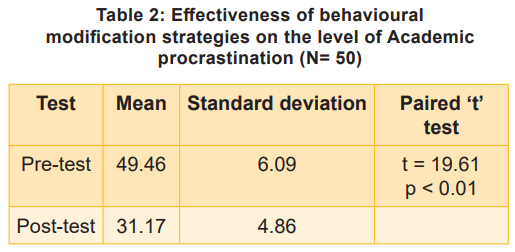Academic procrastination, defined as the voluntary delay of necessary academic tasks, continues to be a pressing concern among university students, especially those in pursuing rigorous programmes such as nursing. It can significantly hinder academic success and contribute to stress and anxiety. Among first-year nursing students, who are adjusting to new academic pressures and expectations, the risk of procrastination can be especially pronounced. Recent studies have shown that academic procrastination negatively impacts students' psychological well-being, academic performance, and self-efficacy. Nursing students, due to the demanding nature of both theoretical and clinical components of their curriculum, are particularly vulnerable. In Egypt, for instance, it was found that higher levels of academic procrastination were significantly correlated with lower levels of academic self-regulation among nursing students (Farag et al, 2023). Similarly, a study in Nigeria demonstrated that students who procrastinated experienced diminished psychological health. Behavioural modification strategies, particularly self-regulation and time management techniques, have shown promise in reducing procrastination. A recent study in Indonesia revealed that applying self-management strategies effectively decreased academic procrastination among nursing students (Oktavia & Nurlina, 2022). Such interventions are especially valuable for first-year students, who may lack the coping mechanisms necessary to manage their time and academic workload effectively. In our study, it was aimed to assess the effectiveness of behavioural modification strategies on academic procrastination among first year BSc Nursing students in a selected college of nursing in Chennai. It was sought to provide evidence-based recommendations for supporting student success in nursing education by implementing and evaluating these interventions.
Objectives
This study was set out with following objectives.
Research Hypotheses
H1 - There is a significant difference in the level of academic procrastination before and after selected behavioural modification strategies among 1st year BSc (Nursing) students.
H2 - There is a significant association in the post-test level of academic procrastination with their selected demographic variables.
Review of Literature
Perdomo et al (2024) carried out a systematic review of the literature in accordance with the PRISMA method standards to find therapies for the decrease or eradication of procrastinating behaviours in college students. The results demonstrated that in-person sessions resulted in significant perceived changes, as participants demonstrated enhanced time management, task planning, awareness, and decreased procrastinating behaviour. The hybrid and online therapies did not indicate any changes in procrastinating behaviour although they did demonstrate some changes in the competencies assessed.
Asri & Kadafi (2020) aimed to determine whether group counselling combined with time management and self-education was successful in reducing academic procrastination in mathematics learning. A purposeful random sampling strategy was utilised to choose sixteen participants for this study, which employed a randomised pre-test post-test comparison group design. While eight of the individualss of group 1 employed the self-instruction technique, the other eight participants of group 2 employed the time management strategy. Tuckman's academic procrastination scale, which refers to academic procrastination characteristics, was used to collect the data.
The findings show that academic procrastination in mathematics learning can be reduced by group counselling combined with self-education and time management strategies. Additionally, self-instruction group therapy works better than time management techniques to reduce academic procrastination.
Methodology
Quantitative research approach with pre-experimental one-group pre- and post-test research design was used to assess the effectiveness of behavioural modification strategies on academic procrastination among 1st year BSc Nursing students of Mohamed Sathak AJ College of Nursing. Samples were selected by a non-probability convenience sampling technique. A brief self-introduction explaining the purpose of the study was given to the students. Samples were seated comfortably in a wellventilated room with adequate privacy. Pre-test was done using a demographic variables proforma and Tuckman's procrastination scale by the self-administered method. On the same day, intervention protocol was initiated and administered, which was scheduled with 30 minutes/day for about one week.
After one month, post post-test was done with the same pre-tested and pre-determined tools. All ethical principles were adhered to throughout the study
Tools Used
Demographic variables proforma: It consists of age in years, gender, Family income, medium of instruction, residence, education of parents, occupation of parents, family status, family system, reason for joining the course, academic procrastination in school and method of spending leisure time.
Tuckman’s procrastination scale: Self-reporting 16 items; 4-point Likert scale, rated from 1 to 4 (Score 1 - that’s not me for sure, Score 2 - that’s not my tendency, Score 3 - that’s my tendency, Score 4 - that’s me for sure). The obtainable score was 16-64. Higher scores indicated higher procrastination and vice versa. Its reliability, as indicated by Cronbach's alpha, is 0.90. Ethical approval was obtained from the author to use the tool through email.
Intervention Protocol
On day 1, following a formal introduction, the monkey trap, the procrastinator’s code, and the procrastination worksheet were done for 30 minutes. On day 2, there was 30-minute intervention in time management and self-motivation. The next day, Relaxation methods, namely, Concentration on breathing, relaxing the muscles, relaxing through visualisation, five-finger relaxation techniques, reducing anxiety, making afraid of procrastination were given. On day 4, the investigator directed on - explore and journal about procrastination, focus on behaviour, procedures based on behavioural principles and emphasis was on current environmental events. Last day recording of thoughts and changing of mood was done for about 30 minutes.
Results
Collected data was analysed using appropriate descriptive and inferential statistics in SPSS-20. Majority 30 (60%) of the subjects were in the age group of 18 years with the mean age of 18.4, about a third, 17(34%) were female, 28(56%) had family income less than Rs 10,000/ month, 33 (66%) had English as a medium of instruction, 28 (56%) were residing in rural area; fathers of 32 (66.6%) samples had education till schooling, 40 (80%) samples’ mother had education till schooling, 19 (38%) fathers were employed as daily wagers, 37 (74%) of their mothers were homemakers, 34 (74%) were from nuclear family, 41 (82%) had both living parents, 30 (60%) were residing in hostel, 33 (66%) were selfinterested to join Nursing course, 27 (56%) of their school academic performance ranged between 71 to 80 percent, 28 (58.3%) were spending their leisure time using mobile phones.

Table 1 shows that during the pre-test, most students (84%) had a high level of academic procrastination. After the application of behavioural modification strategies, the post-test results reflect a notable improvement, with 82 percent of them demonstrating a low level of procrastination. This shift strongly indicates that the intervention was effective in reducing academic procrastination among the 1st year BSc Nursing students.

There was a significant difference in mean academic procrastination scores between pre-test vs post-test (t=19.61, p < 0.01), i.e. mean academic procrastination scores were significantly lower in the post-test than the pre-test, which can be attributed to the effectiveness of selected behavioural modification strategies in the reduction of academic procrastination (Table 2).
As for the association between post-test level of procrastination and selected demographic variables, using Chi-Square with Yates correction, a significant association was found between academic performance in school and level of academic procrastination at p< 0.05. No significant association was found with other variables.
Discussion
The majority of the nursing students, 42 (84%), had a high level of academic procrastination in pre-test; whereas in post-test, 41(82%) had a low level of academic procrastination. The findings are consistent with Sameer et al (2007), who conducted a descriptive study to assess the relationship between academic procrastination and time management of 369 nursing students at the Faculty of Nursing Zagazig University. Results revealed that more than half of nursing students had a moderate level of academic procrastination; a significant difference in mean academic procrastination scores between pretest vs post-test (t=19.61, p < 0.01) attributed to the effectiveness of selected behavioural modification strategies in the reduction of academic procrastination. H1 is accepted.
Significant association between academic performance in school and between the level of academic procrastination at p< 0.012 was noted. H2 is accepted. The findings are supported by the study conducted by Palomino (2023) conducted a cross sectional involved 112 nursing interns aged 18 years and above, enrolled in the 2019 1st semester. Participants completed the academic procrastination scale (EPA), a Likert-like scale consisting of 12 items, measuring two dimensions: academic self-regulation (9 items) and procrastination of activities (3 items). A threshold score of 36 points was used to identify high levels of academic procrastination.
Academic performance (AP) was assessed on a scale of 0-10 (failed), 11-14 (passed), 15-17 (remarkable), and 18-20 (outstanding). Results on a global scale, 70.3 percent achieved a remarkable grade, and 51.8 percent exhibited a high level of AP. However, no significant differences were found based on the level of AP (p=0.918).
To conclude, although nursing students displayed a higher level of AP, this study did not find a significant association between academic procrastination and academic performance during the internship period. However, it is crucial to monitor AP in nursing students throughout their studies to identify potential factors contributing to its impact and develop strategies to mitigate its effects.
Implication
Nursing Research
Examining the efficacy of various behavioural techniques over time may yield additional understanding of academic procrastination. Researchers can create or improve evaluation instruments that gauge procrastination and its effects on clinical and academic performance, enabling institutions to more precisely customise therapies.
Nursing Education
Nursing programmes can enhance student performance and lower stress levels by implementing evidence-based procrastination prevention techniques. Faculty can receive training on how to spot procrastinating patterns early and provide prompt solutions, including tailored counselling or set deadlines for assignments.
Nursing Practice
Procrastination-addressing behavioural techniques can improve clinical readiness and assignment completion on time, resulting in more capable and self-assured practitioners. Early self-regulation training helps nurses apply their abilities in the workplace, which enhances their capacity to prioritise patient care and manage time.
Nursing Administration
Administrators should incorporate behavioural interventions into academic policies to help nursing students overcome procrastination. Educational institutions should fund initiatives that emphasise time management and stress reduction.
Recommendation
A similar study could be done with a large sample size for the generalisation of the findings. Use of productivity apps and digital tools can be evaluated on Academic Procrastination.
Limitations
The study was conducted among first-year students comprising 50 samples. No control group used. There was lack of long-term follow-up.
Conclusion
The study demonstrated that behavioural modification strategies effectively reduced procrastination among first-year BSc. Nursing students. By implementing these strategies, students showed significant improvement in time management and task completion. Behavioural interventions can positively impact academic habits; also, these strategies could be valuable for other educational settings to address procrastination.

This work is licensed under a Creative Commons Attribution-NonCommercial-ShareAlike 4.0 International License.